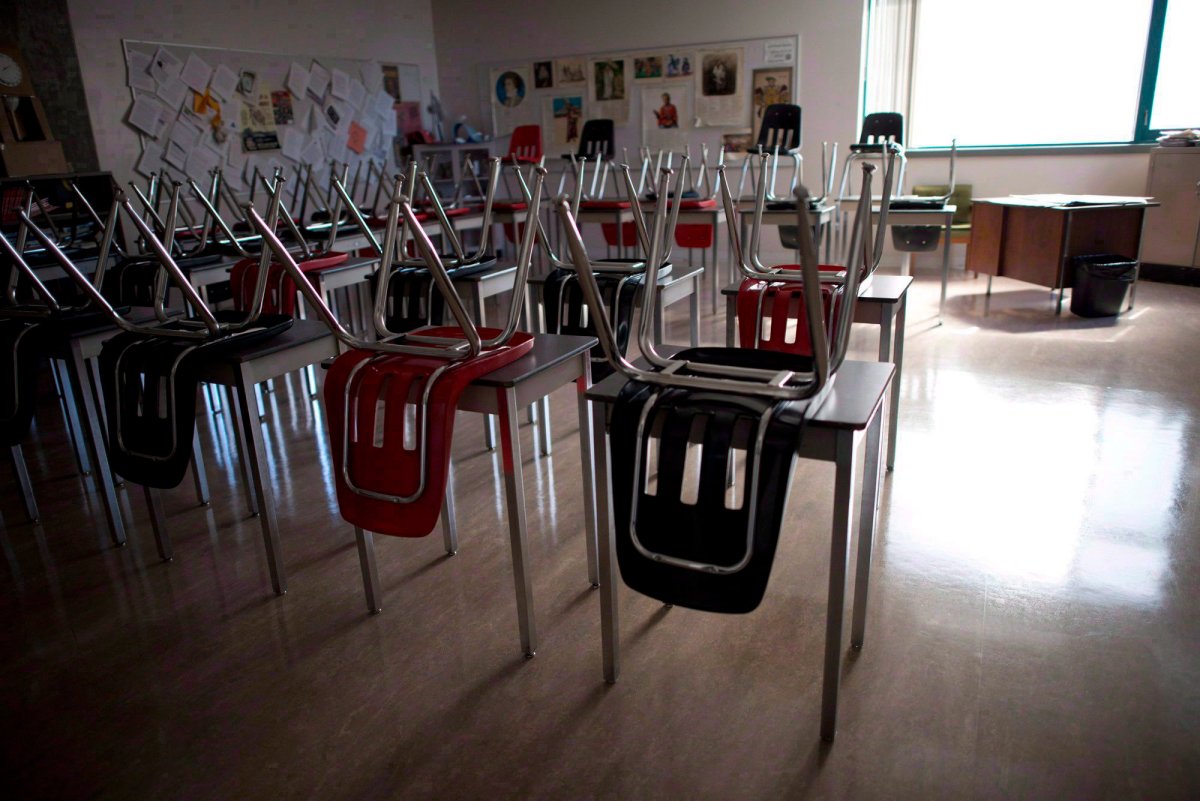Larger class sizes and mandatory online learning could spell bad news for students in London and southwestern Ontario, according to a recent report from the Canadian Centre for Policy Alternatives (CCPA).

The report from the non-partisan think tank suggests 487 fewer teachers in the Thames Valley District School Board (TVDSB) and London District Catholic School Board (LDCSB) by 2023-24 because of the provincial government’s proposed education changes. Across southwestern Ontario, that figure rises to more than 1,600 teachers, not including French language teachers.
Provincially, the CCPA says around 10,000 teachers will be impacted by the province’s plans, which include increasing Grade 4 to 8 class sizes from 23.84 students per teacher to 24.5, and increasing Grade 9 to 12 class sizes from 22 students per teacher to 28.
The Ford government is also planning on requiring high school students earn four credits online instead of in the classroom.
The CCPA’s provincial figure is similar to one released in September by the province’s Financial Accountability Office.
The loss of nearly 500 teaching positions in the London area would have a major impact on student success, said the head of the local district for the Ontario Secondary School Teachers Federation.
High school teachers within the TVDSB would be most impacted by the changes, seeing 334 job losses by 2023-24 compared to 39 elementary teachers.
Under the LDCSB, 104 high school teaching jobs and 10 elementary teaching jobs would be lost, according to the CCPA report.
“It would mean huge classes. You can imagine 334 fewer teachers means 2,000 fewer classes in Thames Valley, so you’re going to have to squeeze those students into that smaller number of classes,” said OSSTF District 11 president, John Bernans.
“It’s going to mean less time with the adult in the room, and it’s likely going to mean poor graduation rates, and have an impact on student success.”
There are 48 fewer high school teachers within the TVDSB this year, but that’s due to teachers taking buyouts and the school board using emergency funds to maintain teaching levels.

“We have classes where students really struggle, and those classes, right now, they’re smaller classes,” Bernans said. “Those classes, I don’t know if those will be able to run (with the increase).
“Those students that really need that intensive support, my feeling is they’re not going to get that.”
Bernans said while he understands the need to balance the books — Ontario is projecting a $10.3 billion deficit for 2019-20 — he argues it doesn’t seem that there is a good financial argument for the changes. He cites a Conference Board of Canada report, commissioned by the OSSTF, that suggests every dollar spent on public education generates $1.30 in economic impact for Ontario.
“The minister says it’s not a financial exercise, so I’m having a hard time understanding what kind of exercise it is.”
The CCPA report comes as the province continues contentious contract talks with the OSSTF, the Elementary Teachers Federation of Ontario (ETFO), and the Ontario English Catholic Teachers’ Assocation (OECTA).
Last week, ETFO members voted 98 per cent in favour of strike action should it become necessary, and on Monday, the union requested a no-board report. Once issued, elementary teachers would be in a legal strike position 17 days later.
- What is a halal mortgage? How interest-free home financing works in Canada
- Capital gains changes are ‘really fair,’ Freeland says, as doctors cry foul
- Ontario doctors offer solutions to help address shortage of family physicians
- Canada will take bigger economic hit than U.S. if Trump wins election: report
ETFO representatives also met with a conciliator on Monday, but the talks saw no real movement, the union said.
While secondary school teachers were issued a no-board report on Friday, meaning they could be in a legal strike position as of Nov. 18, the union doesn’t yet have a strike mandate from members — those votes are set to finish Nov. 15.
English Catholic Teachers are also holding a strike vote, with results expected in the next couple of weeks.
The province extended an olive branch to the OSSTF late last month, saying it was willing to lower the high school class size increase from 28 to 25. Union president Harvey Bischof downplayed the concession, saying the revised increase would still result in major job losses among high school teachers and impact student experience.
The CCPA says even with the province’s reduced increase, some 6,000 teachers across the province — 1,000 elementary teachers, and 4,900 high school teachers — would still see job losses over the next five years. Locally, 221 teachers would be impacted at the TVDSB and 66 at the LDCSB.
“It is so upsetting that this government is spending so much time, for example, this week worrying about cellphones in classrooms, (worrying) about dogs being allowed on patios in bars in this province and more importantly spending so much time interfering in the collective bargaining process by pushing forward Bill 124,” said ETFO president Sam Hammond on Monday after the union’s no-board request.
Bill 124 would limit wage increases for public sector workers to one per cent a year for three years. That is the wage increase agreed to by the Canadian Union of Public Employees (CUPE) on behalf of its 55,000 education workers.
The eleventh-hour tentative deal was reached in early October and narrowly avoided a strike which would have seen two dozen school boards close their doors. On Monday, CUPE members voted 79 per cent to ratify the deal.
— With files from Devon Peacock and The Canadian Press








Comments